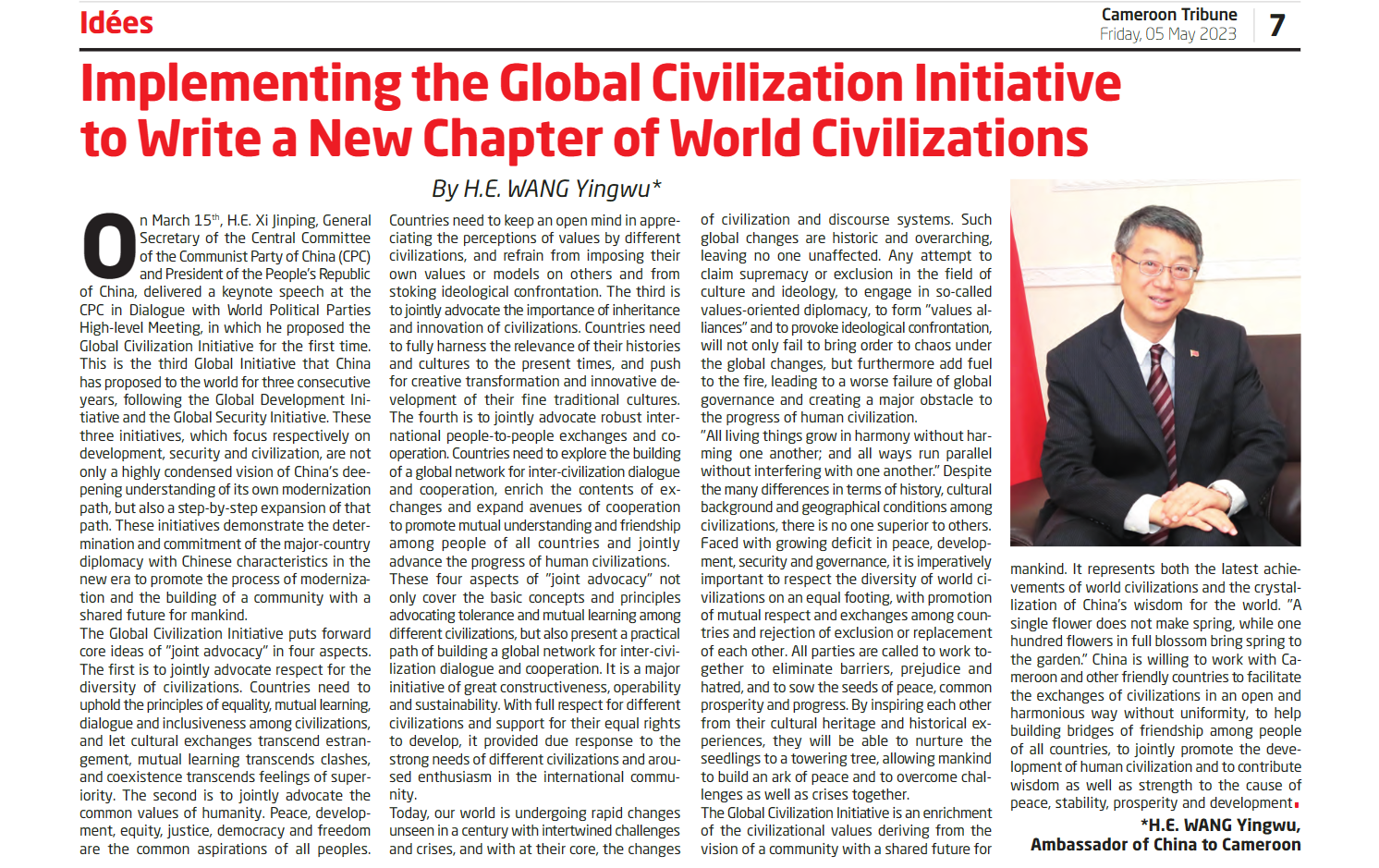S.E.M. l'Ambassadeur WANG Yingwu a publié, le 5 mai 2023, un article intitulé "Implementing the Global Civilization Initiative to Write a New Chapter of World Civilizations'' dans "Cameroon Tribune". Voici le texte intégral:

On March 15th, H.E. Xi Jinping, General Secretary of the Central Committee of the Communist Party of China (CPC) and President of the People’s Republic of China, delivered a keynote speech at the CPC in Dialogue with World Political Parties High-level Meeting, in which he proposed the Global Civilization Initiative for the first time. This is the third Global Initiative that China has proposed to the world for three consecutive years, following the Global Development Initiative and the Global Security Initiative. These three initiatives, which focus respectively on development, security and civilization, are not only a highly condensed vision of China's deepening understanding of its own modernization path, but also a step-by-step expansion of that path. These initiatives demonstrate the determination and commitment of the major-country diplomacy with Chinese characteristics in the new era to promote the process of modernization and the building of a community with a shared future for mankind.
The Global Civilization Initiative puts forward core ideas of "joint advocacy" in four aspects. The first is to jointly advocate respect for the diversity of civilizations. Countries need to uphold the principles of equality, mutual learning, dialogue and inclusiveness among civilizations, and let cultural exchanges transcend estrangement, mutual learning transcend clashes, and coexistence transcend feelings of superiority. The second is to jointly advocate the common values of humanity. Peace, development, equity, justice, democracy and freedom are the common aspirations of all peoples. Countries need to keep an open mind in appreciating the perceptions of values by different civilizations, and refrain from imposing their own values or models on others and from stoking ideological confrontation. The third is to jointly advocate the importance of inheritance and innovation of civilizations. Countries need to fully harness the relevance of their histories and cultures to the present times, and push for creative transformation and innovative development of their fine traditional cultures. The fourth is to jointly advocate robust international people-to-people exchanges and cooperation. Countries need to explore the building of a global network for inter-civilization dialogue and cooperation, enrich the contents of exchanges and expand avenues of cooperation to promote mutual understanding and friendship among people of all countries and jointly advance the progress of human civilizations.
These four aspects of "joint advocacy" not only cover the basic concepts and principles advocating tolerance and mutual learning among different civilizations, but also present a practical path of building a global network for inter-civilization dialogue and cooperation. It is a major initiative of great constructiveness, operability and sustainability. With full respect for different civilizations and support for their equal rights to develop, it provided due response to the strong needs of different civilizations and aroused enthusiasm in the international community.
Today, our world is undergoing rapid changes unseen in a century with intertwined challenges and crises, and with at their core, the changes of civilization and discourse systems. Such global changes are historic and overarching, leaving no one unaffected. Any attempt to claim supremacy or exclusion in the field of culture and ideology, to engage in so called values-oriented diplomacy, to form "values alliances" and to provoke ideological confrontation, will not only fail to bring order to chaos under the global changes, but furthermore add fuel to the fire, leading to a worse failure of global governance and creating a major obstacle to the progress of human civilization.
"All living things grow in harmony without harming one another; and all ways run parallel without interfering with one another." Despite the many differences in terms of history, cultural background and geographical conditions among civilizations, there is no one superior to others. Faced with growing deficit in peace, development, security and governance, it is imperatively important to respect the diversity of world civilizations on an equal footing, with promotion of mutual respect and exchanges among countries and rejection of exclusion or replacement of each other. All parties are called to work together to eliminate barriers, prejudice and hatred, and to sow the seeds of peace, common prosperity and progress. By inspiring each other from their cultural heritage and historical experiences, they will be able to nurture the seedlings to a towering tree, allowing mankind to build an ark of peace and to overcome challenges as well as crises together.
The Global Civilization Initiative is an enrichment of the civilizational values deriving from the vision of a community with a shared future for mankind. It represents both the latest achievements of world civilizations and the crystallization of China’s wisdom for the world. "A single flower does not make spring, while one hundred flowers in full blossom bring spring to the garden." China is willing to work with Cameroon and other friendly countries to facilitate the exchanges of civilizations in an open and harmonious way without uniformity, to help building bridges of friendship among people of all countries, to jointly promote the development of human civilization and to contribute wisdom as well as strength to the cause of peace, stability, prosperity and development.